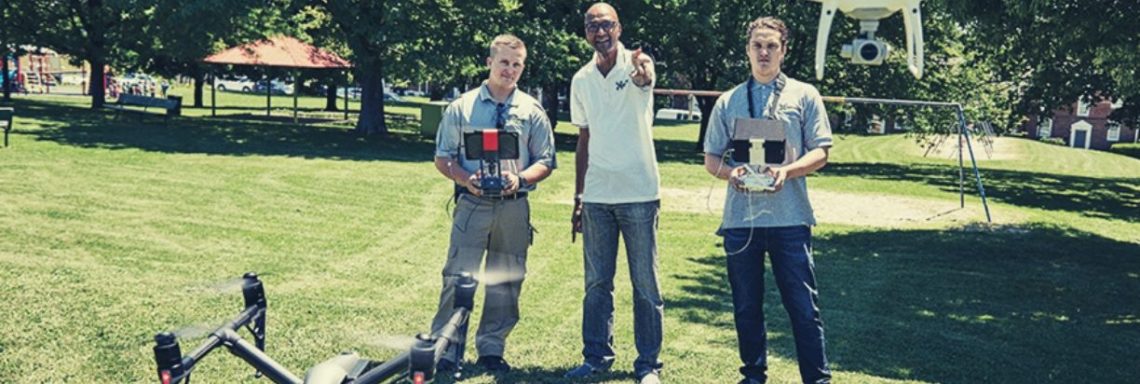How Theo Nix is preparing a new generation of drone professionals and entrepreneurs
When Kevin Edwards of Dover left the Marine Corps Reserve last August, he was on the lookout for an opportunity. After hearing about a presentation by Wilmington drone entrepreneur Theo Nix at a Rotary Club meeting, his interest was piqued.
“I got into his class at the last minute and discovered it was something I had a knack for,” he said. To Edwards, the best way to describe the potential of drones was a phrase Nix used: “He called it a ‘Model T moment.’”
The potential of joining a nascent industry at the ground floor attracted Nix to the field, too. In 2016, he and his wife, Suzanne, started Drone Workforce Solutions, or DWS, in Wilmington.
The business has its sights set on two separate but related businesses: training drone operators and building the drone pilot staffing company for corporate America and the government. Within the next week, he expects to go live with this online platform — including an app for Apple and Android devices — to connect drone operators with jobs.
Drones are set to become a $100 billion industry through 2020, according to a report from Goldman Sachs. Of that total, 70 percent is estimated to be generated by the military, but the report finds the fastest growth opportunity is coming from businesses and government.
In Delaware, governments have begun to use drones to provide traffic control and security, and corporations are using them to inspect roofs, show off real estate and plenty more.
The workforce potential has not escaped education and labor officials.
The costs of entry, especially in time, are relatively low when compared with other technical occupations. Aside from the cost of a drone — entry-level business models range from $1,500 to about $7,000 — the only requirements to fly a drone commercially are to be 16, pass a test and get a license.
Nix’s company has received three grants from the Delaware Department of Labor totaling about $136,000 to survey the demand for and then begin operations at his drone school. The first class of 12 graduated in December, and he said about 50 more people have expressed interest.
Nix is not simply content to train pilots and send them off. The second part of the business, and a selling point for the classes, is to create a nationwide staffing database of drone pilots.
The lack of established industry standards and big-name pilot companies is essentially a business opportunity. There aren’t many options for businesses that want operators but don’t want to go through the trouble of training their own people.
A client, such as a company or government agency, comes to DWS and pays for a certain number of drone pilots in a certain place. DWS then offers the job to its pilots — whose credentials it has verified — based on their location and skill set.
Originally trained in the law, Nix finds the sense of potential invigorating.
“Drones can change the way corporate America and government can solve problems,” he said.
Have drone, will travel
The most straightforward way to break into the drone business is relatively simple in concept: Pass the Federal Aviation Administration’s so-called “Part 107” test and go into business for yourself.
Delaware Technical Community College offers 15-hour online and field classes for $215 with the goal of preparing students to take their exam and earn their license. They also offer a four-hour course for hobbyists.
“If someone is looking to retool and go in a different direction in life, maybe they’re laid off or currently unemployed, come to Del Tech,” said Chris Moody, director of workforce development at the Georgetown campus.
Del Tech is currently studying the labor market for drones in Delaware; despite all the buzz around drones, there are few solid numbers tracking their real demand.
Drone Workforce Solutions trains would-be drone pilots, too, but its pitch is different. To Nix, regular courses are fine for helping you pass the Part 107 test. But he said his service offers something at once more valuable but less tangible — connections.
Nix said he learned the language and culture of corporate America during his time working for a Fortune 100 company. Anyone can learn to fly a drone, but Nix said the business connections are key to actually finding work.
Spread across 10 weeks with 70 hours of instruction, the course also teaches students to build their own drones, from soldering wires to screwing the frame together. The class cost $6,000, with the first 10 people in each class getting 20 percent off.
A third path is for businesses to re-train their existing employees in drone operation.
That is the route taken by the State of Delaware, which has created its own standardized training program so that pilots from different agencies can work together. The Delaware Department of Transportation has now trained seven drone operators, said Dwayne Day, a homeland security planner.
Most recently, they used drones for traffic control at the 2018 Firefly Music Festival, where planners faced the task of getting thousands of vehicles out of parking lots quickly and safely.
“For example, say we want to do a lot count to find the percentage of vehicles, and instead of putting somebody in there you can fly over the top, snap a picture and timestamp it,” he said. “You could be in a different lot 15 seconds later, and get images with a lot more accuracy and detail.”
DelDOT is also using drones to map beach erosion, inspect bridges and survey roads. As with many drone operations, the major limitation is time; it depends on the model and wind conditions, but a drone can stay airborne for only perhaps 20 minutes before running low on power.
Day said DelDOT is looking into acquiring drones that are tethered to a power supply and can stay up for hours at a time.Whether they take a quick course at DelTech or a longer version at DWS, drone operators graduate with the option of seeking a job. In its initial planning phase, DWS found 22 job openings for drone operators.
Or, like Edwards, they can take an even bigger jump and go into business for themselves.
A safer, cheaper option
Edwards, the former Marine-reservist-turned-drone-operator, is seeking to tap into Delaware’s corporate market by focusing on industrial services like damage assessment, mapping and roof inspections. In these cases, he said, companies are adapting drones as a safer, cheaper alternative to in-person inspections.
He uses an Inspire 2, a heavy-duty drone that can carry equipment such as thermal imaging. The drone costs roughly $5,000, with the high-tech camera more than doubling that price, to close to $14,000.
But heat-sensing imaging is worth it. It allows his drone to scope out gas leaks and electrical issues and see where water has pooled on a roof.
“It’s actually a lot cheaper to put a drone in the air than to put a crew up on a roof,” he said.
Edwards is new to business, but has found that much of marketing and finding customers comes down to networking. One such conversation with a facility manager revealed the man wasn’t looking forward to sending a crew atop a roof.
“He was thrilled that we were able to keep him from getting up on that roof,” he said.
Edwards has plenty of growth targets for his business, called Front-Line Professional Aerial Services. He’d like to use drones to fly over farm fields to analyze the state of a crop, zero in on problem areas and even drop chemicals, such as insecticide.
Real estate is another major potential market, as drones can capture video of a property and its surroundings to market it online.
Matthew Bezerra, a 17-year-old from Mountainside, New Jersey, who co-founded Kino Cinematics, LLC, with his younger brother, said he has pilots around the country whose goal it is to “take the worry and the stress” out of capturing high-resolution drone video for listing agents.
He was contacted by Nix about employing some pilots who graduated from the DWS class.
“Our pilots have guidelines and standards to ensure the property is captured in all the best angles,” Bezerra said. It’s not simply a matter of flying in circles above a house.
“While it’s easy to take video, it’s not easy at all to create a story that people can follow to make them feel welcome at a house,” he said.
Because clients face potential liability if a pilot makes a mistake, finding trustworthy and well-trained pilots is a priority for Bezerra.
“I want Delaware to be one of the nation’s drone incubator spaces,” he said.


Add Comment